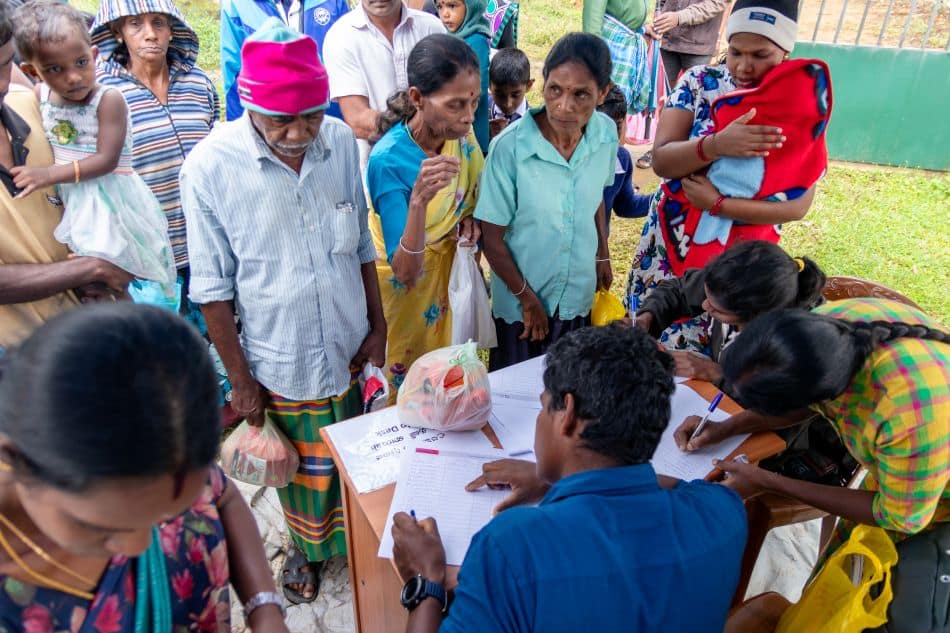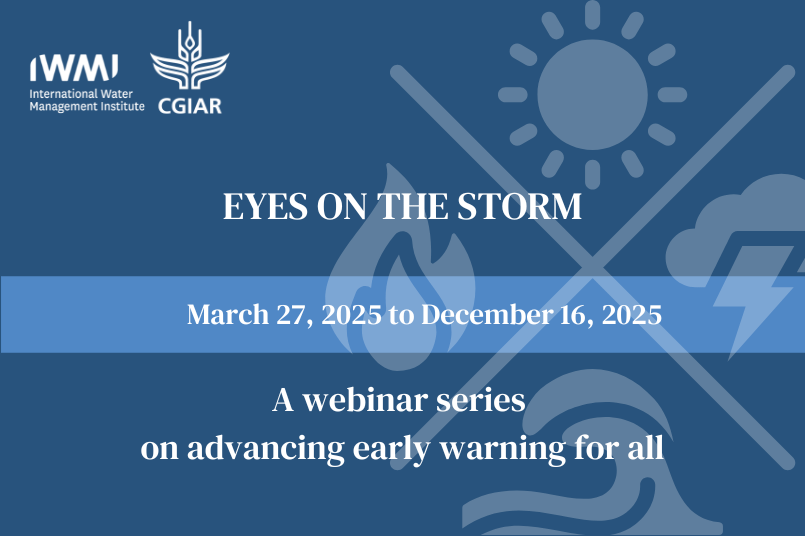
The International Water Management Institute (IWMI) launches “Eyes On The Storm” on March 27, 2025 – a series of webinars to raise awareness, promote knowledge-sharing and provide actionable solutions to strengthen early warning systems (EWS) across various hazards, sectors and regions.
As climate-related disasters intensify worldwide, the urgency of robust early warning systems has never been greater. Vulnerable communities, particularly in the global south, face the brunt of climate-induced hazards, making timely and effective early warnings a matter of survival. To address this pressing challenge, the United Nations Secretary-General launched the Early Warning for All initiative in 2022, aiming to ensure universal access to early warning information by 2027.
A primer on early warning systems and disaster preparedness, IWMI’s Eyes On The Storm webinar series offers professionals the chance to stay on top of the latest trends in the sector and connect with a global network of experts, policymakers and practitioners driving disaster risk reduction.
The series, running from March 27, 2025 to December 16, 2025, consists of 19 webinars – each deep diving into a different aspect of disaster preparedness. Each webinar will include expert presentations, interactive Q&A sessions and discussions to encourage multi-disciplinary dialogue. The speakers are all specially selected experts who are at the top of their individual fields.
The objective of Eyes On The Storm is to strengthen early warning systems in line with the UN initiative, focusing on building resilience in vulnerable regions. By promoting global collaboration and knowledge-sharing, the series seeks to develop actionable solutions to enhance EWS and mitigate the impacts of climate-related disasters. Engaging stakeholders from government, private sectors and civil society, it contributes to sustainable socioeconomic development and resilience frameworks.
Eyes On The Storm primarily targets policymakers, government agencies, disaster risk management professionals, meteorological and hydrological services and financial institutions. It also, however, welcomes non-government organizations, development partners, private sector stakeholders, academia, technology innovators and any other party or individual interested in fostering collaboration across sectors to enhance the reach and effectiveness of early warning systems.
Giriraj Amarnath, Principal Researcher – Disaster risk management and climate action, IWMI, said Eyes On The Storm was a platform for global collaboration. He said the series would showcase different types of early warning systems, technological innovations and global best practices and bridge critical gaps addressing challenges in dissemination, last-mile delivery and effective implementation.
Amarnath said the goal was to foster multi-sector collaboration, engaging policymakers, practitioners, the private sector and civil society to strengthen investments in early warning systems.
Eyes On The Storm will also highlight innovative solutions and policies to scale early warning systems worldwide. It will synthesize learning, developing actionable recommendations for integrating early warning mechanisms into global policies and investment strategies.
Amarnath said, “As climate change accelerates, the need for inclusive, efficient and technology-driven early warning systems is paramount. Eyes On The Storm serves as a critical platform for stakeholders to exchange knowledge, forge partnerships and drive investment toward scalable, impactful solutions. By uniting global expertise, this initiative brings the world one step closer to realizing the early warning for all vision ensuring that no one is left behind when disaster strikes.”
Eyes On The Storm is a collaboration between IWMI, the Coalition for Disaster Resilient Infrastructure (CDRI), COPE Disaster, the International Federation of Red Cross and Red Crescent Societies (IFRC), International Telecommunication Union (ITU), National Oceanic and Atmospheric Administration (NOAA), Risk-informed Early Action Partnership (REAP), the UK Met Office, United Nations Economic and Social Commission for Asia and the Pacific, United Nations Office for Disaster Risk Reduction (UNDRR) and the World Meteorological Organization (WMO).
Eyes On The Storm – a webinar series on advancing early warning for all
Register here for the webinars here or watch the ones you missed.

















